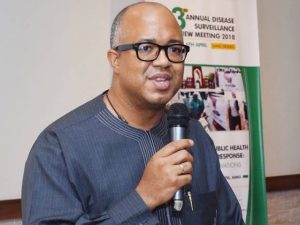
The Nigerian Centre for Disease Control (NCDC) says no fewer than 816 persons have died from an outbreak of cholera in 22 states across the country and Abuja, the nation’s capital, this year.
The Director-General of the Centre, Dr. Chikwe Ihekweazu, said this in a press release sent to Naija News in Abuja on Monday.
He said that the affected states are Benue, Delta, Zamfara, Gombe, Bayelsa, Kogi, Sokoto, Bauchi, Kano, Kaduna, Plateau, Kebbi, Cross River, Niger, Nasarawa, Jigawa, Yobe, Kwara, Enugu, Adamawa, Katsina, Borno and FCT.
Ihekweazu said that the National Cholera Situation Report indicated that there were 31,425 suspected suspected cases of the disease in parts of the country.
He said, “between the 1st of January and 1st of August 2021, 31,425 suspected cases of cholera, 311 confirmed cases and 816 deaths have been reported from 22 states and FCT.
“This has been exacerbated by poor access to clean water, open defecation, poor sanitation, and hygiene.”
The NCDC boss said that the National Cholera Emergency Operation Centre has led the deployment of rapid response teams to support the most affected states – Benue, Kano, Kaduna, Zamfara, Bauchi and Plateau; adding that the NCDC and its partners have provided states with commodities for case management and laboratory diagnosis, materials for risk communications, response guidelines among other support.
However, he maintained that none of these medical interventions would solve the underlying issues leading to cholera outbreaks.
According to him, “Cholera is a waterborne disease, and the risk of transmission is higher when there is poor sanitation and disruption of clean water supply. Without proper water, sanitation, and hygiene (WASH), Nigeria remains at risk of cholera cases and deaths.
“The long-term solution for cholera control lies in access to safe drinking water, maintenance of proper sanitation and hygiene.
“We continue to advocate to State Governments to prioritise action for solutions that ensure access to and use of safe water, basic sanitation and good hygiene practices in communities.
“Additionally, we urge Nigerians to keep their environments clean, only drink or use water that is boiled and stored safely, ensure food is cooked and stored in a clean and safe environment, avoid open defecation and wash their hands regularly with soap and running water.
“Cholera is preventable and treatable; however, it can be deadly when people who are infected do not access care immediately.
“As the NCDC continues to work with partners to lead the health-sector response to cholera outbreaks, we call for an urgent improvement in access to clean water, proper sanitation and hygiene.”
This article was originally published on Nigeria News


